Key takeaways:
- CFTC guidelines are essential for investor protection, market integrity, and adherence to legal responsibilities in trading.
- Key areas of CFTC regulations include reporting requirements, anti-manipulation rules, and customer protection measures, which ensure transparency and fairness in the marketplace.
- Future trends in CFTC regulations may focus on increased transparency, ESG accountability, and the harmonization of international compliance standards.
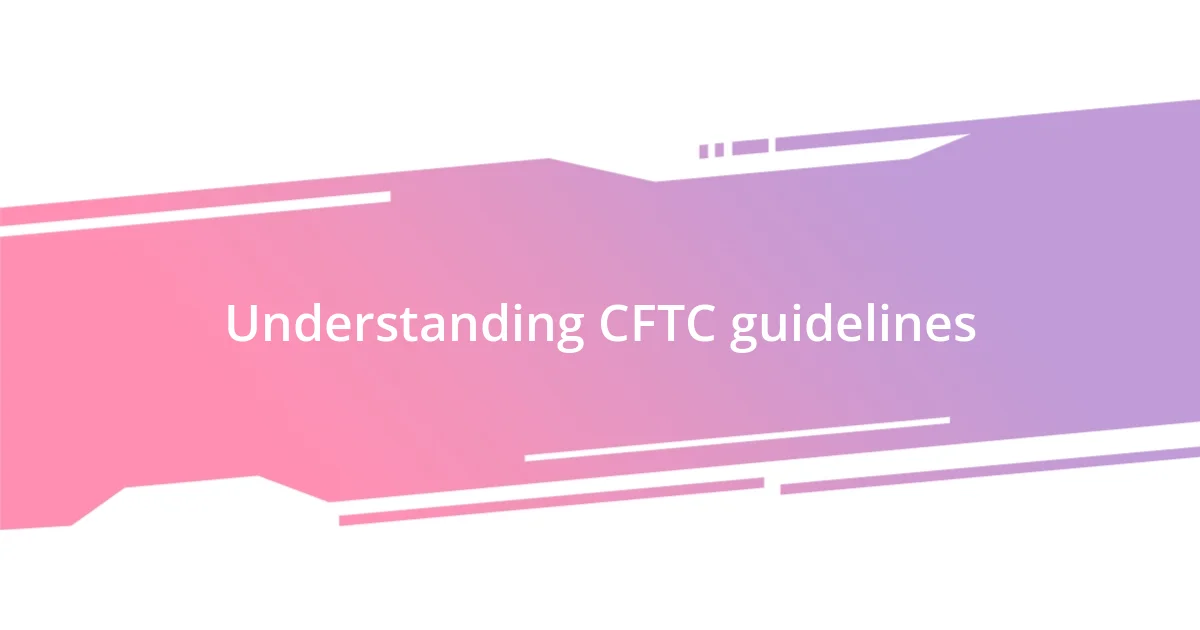
Understanding CFTC guidelines
Understanding CFTC guidelines can feel a bit overwhelming at first, especially if you’re new to the world of futures and options trading. I remember when I started out, I had so many questions swirling in my head—like, “What exactly does compliance mean for my trading activities?” These guidelines exist primarily to protect investors and ensure a fair marketplace, which is something I appreciate now more than ever.
Diving deeper into these regulations, I learned that the Commodity Futures Trading Commission (CFTC) enforces rules regarding market manipulation and fraud. The very first time I read about these anti-manipulation laws, I was struck by the commitment to transparency and ethics. It made me ponder: how can we expect a thriving market if there’s no trust?
As I navigated the specific provisions of the guidelines, I found that they cover everything from reporting requirements to the responsibilities of traders and FCMs (Futures Commission Merchants). It can sometimes feel like trying to solve a complex puzzle, but each piece is crucial. Reflecting on my experiences, I now see how understanding these details enhances not only my trading strategies but also my confidence in participating in the market.
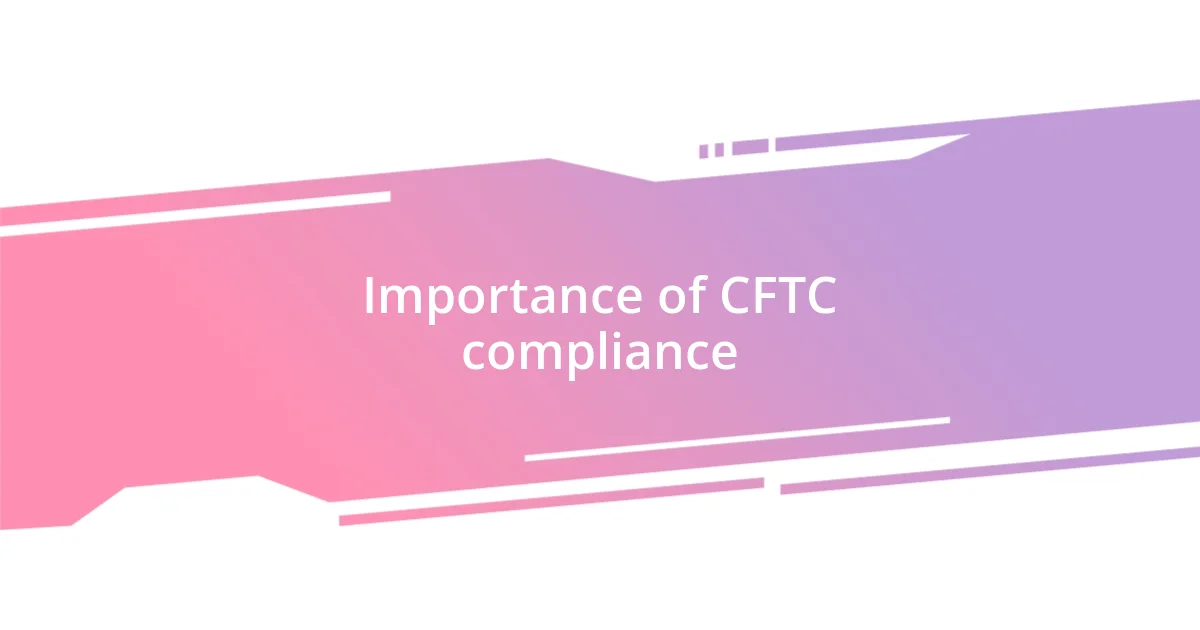
Importance of CFTC compliance
When I first dug into the importance of CFTC compliance, it hit me how critical it is for maintaining integrity in the marketplace. I vividly recall a moment of realization when a mentor shared a story about someone who overlooked compliance and faced severe penalties. It underscored that being compliant isn’t just about following rules; it’s about fostering a trustworthy trading environment. This awareness gave me a greater appreciation for why the CFTC exists and how their guidelines protect all of us involved in futures trading.
Here are some reasons why compliance is essential:
- Investor Protection: Compliance ensures that traders are treated fairly, safeguarding their investments.
- Market Integrity: Following CFTC rules helps maintain fair competition and prevents market manipulation.
- Reputation Management: Firms known for compliance build credibility and trust with clients, which is crucial in this industry.
- Avoiding Penalties: Non-compliance can lead to hefty fines and legal troubles, jeopardizing a firm’s future.
- Promoting Stability: A compliant market fosters a stable environment, encouraging more participants and investment.
Reflecting on these points, I see how adhering to CFTC guidelines truly shapes the landscape of trading, protecting not just my interests but the entire community.
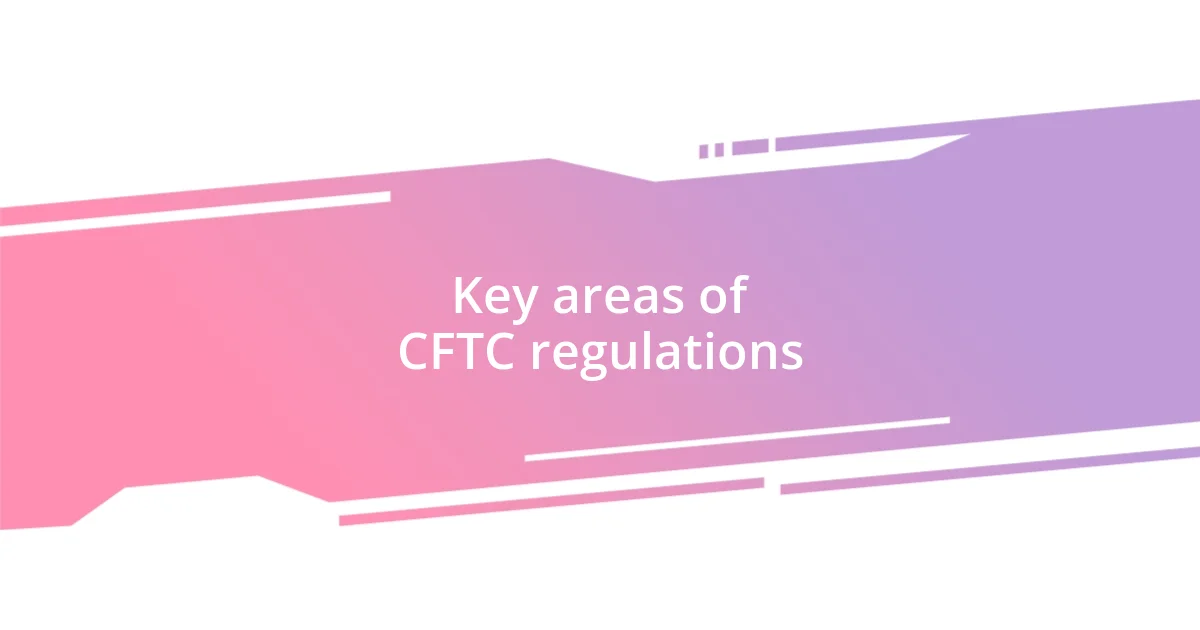
Key areas of CFTC regulations
In my journey through CFTC regulations, I discovered three pivotal areas that stand out: reporting requirements, anti-manipulation rules, and customer protection measures. Initially, the reporting requirements puzzled me. I remember the first time I prepared a report—I was anxious, thinking, “Is my data accurate enough?” However, I soon realized that these submissions are crucial for ensuring transparency in trading.
Anti-manipulation laws are another key area that really resonated with me. When I understood their significance, I felt a renewed sense of responsibility as a trader. Knowing that these rules work to deter fraud and uphold fairness made me more vigilant in my trading practices. It’s a reassuring reminder that the market isn’t just a free-for-all; it has safeguards in place.
Customer protection measures encompass a wide range of guidelines that are designed to secure investor interests. Reflecting on the stories I’ve heard about traders facing challenges due to negligence of these regulations made me realize that understanding customer protections is not just a regulatory requirement, but a moral obligation for everyone involved in the trading ecosystem. The weight of these regulations can feel heavy sometimes, but it empowers me to trade responsibly.
| Key Area | Importance |
|---|---|
| Reporting Requirements | Ensures transparency and data integrity in trading activities. |
| Anti-Manipulation Rules | Prevents fraudulent practices and maintains a fair trading environment. |
| Customer Protection Measures | Safeguards investor interests and fosters trust in the marketplace. |

Steps to navigate CFTC guidelines
Navigating the CFTC guidelines can initially feel overwhelming, but breaking it down into manageable steps makes the process smoother. First, I recommend starting with a comprehensive review of the regulations that apply specifically to your trading activities. I remember when I first tackled this; I spent hours sifting through documents and came out with a clearer understanding of what was required. Focusing on the key topics that relate to your operations helps eliminate the noise.
Next, I found it immensely helpful to create a compliance checklist tailored to my activities. This checklist became my roadmap, guiding me through reporting deadlines, record-keeping requirements, and any updates in legislation. It’s almost like having a co-pilot on a flight—ensuring you don’t miss a vital step along the journey!
Finally, staying engaged with industry news and participating in webinars can provide real-time insights into evolving guidelines. I distinctly remember a webinar that illuminated a recent regulatory change I hadn’t caught in the news. It was a refreshing reminder: continual learning isn’t just beneficial; it’s essential in this ever-evolving landscape. Are you ready to make CFTC compliance a part of your routine? Trust me; it pays off in the long run!
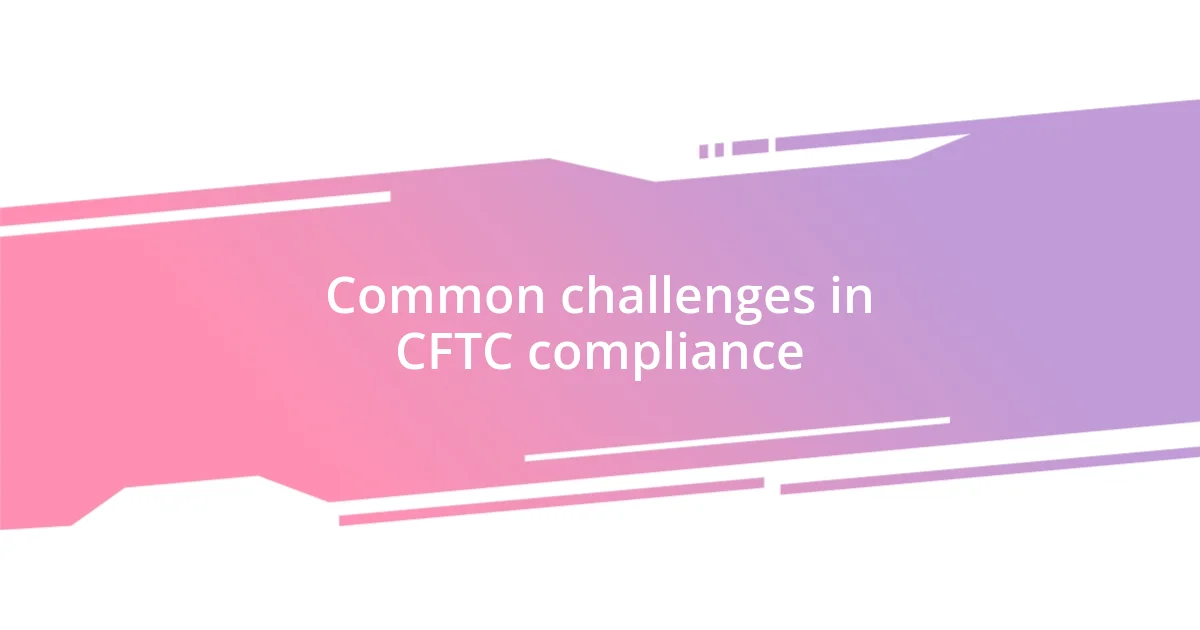
Common challenges in CFTC compliance
Common challenges in CFTC compliance can often feel like steep mountains to climb. I recall one particular incident when I misinterpreted a reporting deadline, leading to a last-minute scramble to submit documentation. That stress taught me just how vital it is to stay on top of the dates and requirements, emphasizing that even a minor oversight can have major repercussions.
Another hurdle I faced was grasping the intricacies of anti-manipulation rules. At first, the legal jargon seemed like a foreign language, and I worried about unintentionally crossing a line. I remember sitting in front of my computer, thinking, “How can I possibly ensure compliance?” But through diligent study and engagement with experts in the field, I slowly learned to navigate these regulations and was relieved to discover that support exists within the community.
Customer protection measures can also present a challenge, particularly when it comes to fully understanding your responsibilities as a trader. I’ve seen firsthand how neglecting these guidelines can lead to dire consequences for both clients and businesses alike. Reflecting on this, I often ask myself, “What can I do better?” Emphasizing the importance of honoring these protections not only safeguards my clients but fosters a sense of trust that’s irreplaceable in our industry.
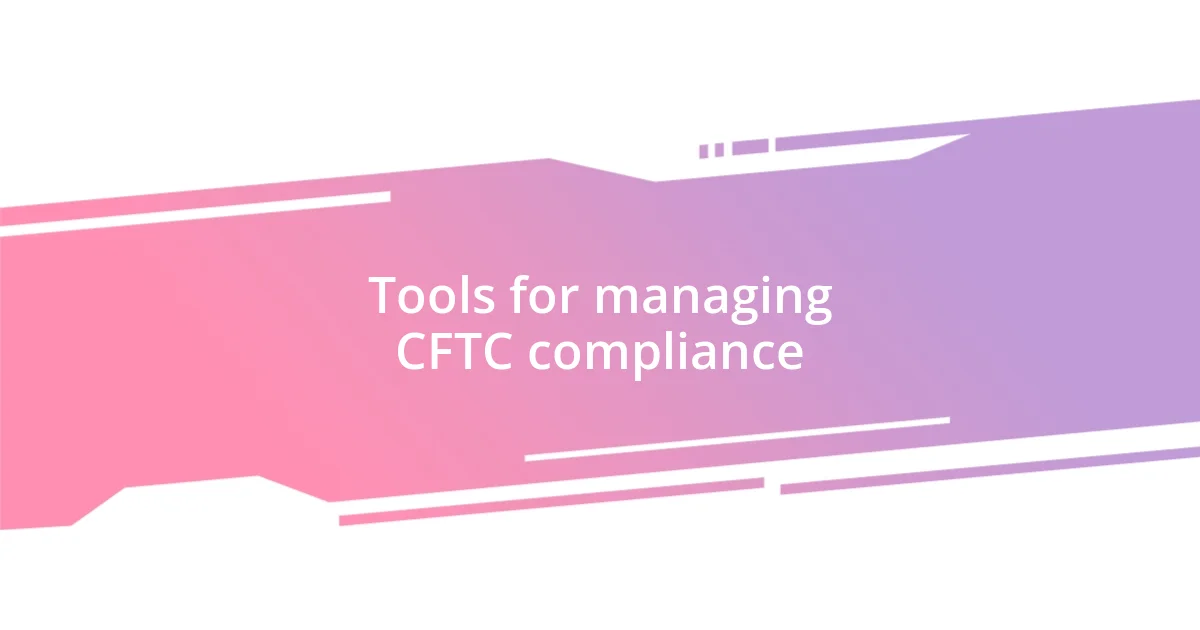
Tools for managing CFTC compliance
Managing CFTC compliance can feel like trying to juggle multiple balls in the air. I often rely on specialized software tools designed for compliance tracking, which streamline the process significantly. The first time I used such a platform, it felt like a weight lifted off my shoulders; suddenly, I had a clear dashboard showing my compliance status, deadlines, and any potential gaps. Has anyone else felt that relief when technology simplifies a daunting task?
Another invaluable resource I discovered is engaging with compliance consultants. I remember reaching out to a consultant during a particularly chaotic regulatory change. The guidance I received was incredible—having an expert to turn to not only clarified complex issues but also offered peace of mind. It made me wonder, how much easier my journey could have been if I had sought help earlier? Sometimes, it’s worth investing in expert advice to avoid the pitfalls of DIY compliance.
Finally, I can’t stress enough the significance of strong internal policies. Developing a robust compliance program within your organization helps create a culture of adherence to regulations. Reflecting on my experience, I once implemented regular compliance training sessions that transformed our team’s understanding of the rules. The discussions sparked energy and enthusiasm. Have you considered how a culture of compliance could enhance not just adherence but team morale as well? This proactive approach pays dividends in both compliance and workplace harmony.
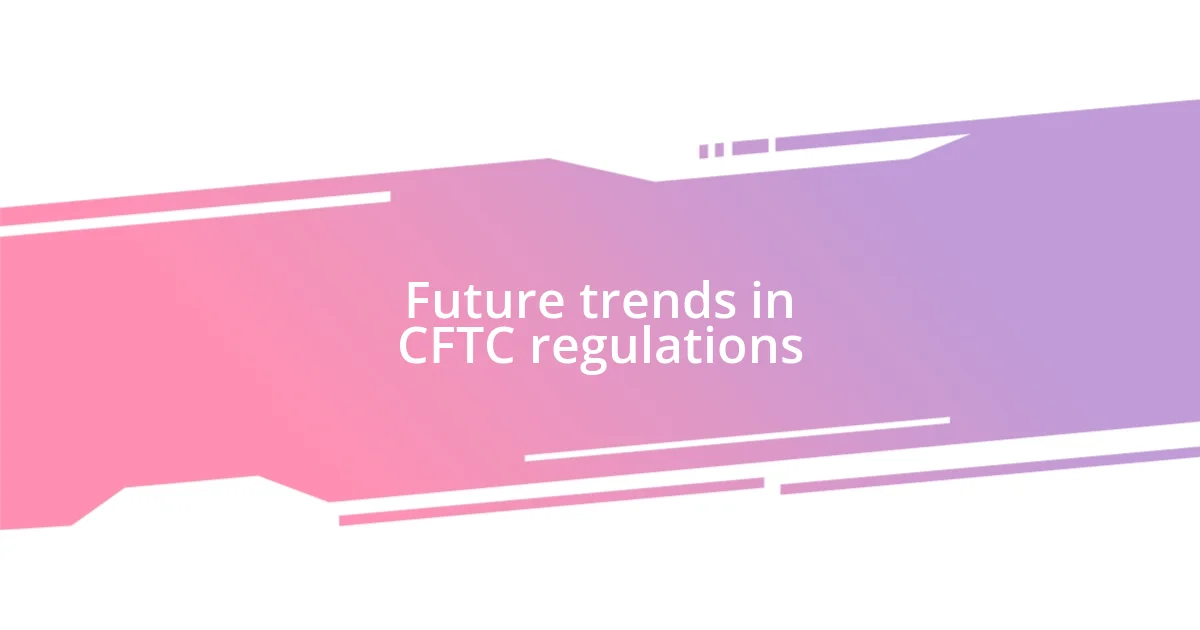
Future trends in CFTC regulations
As I look into the future of CFTC regulations, I can’t help but feel a shift toward increased transparency. Imagine a world where traders can access near real-time information on market conditions and compliance requirements. I believe this change would empower us, as participants, to make more informed decisions while keeping the integrity of the markets intact. It’s exciting to think about how technology could bridge the gap between complex regulations and practical application.
Moreover, I anticipate a sharp focus on environmental, social, and governance (ESG) factors influencing regulatory standards. Reflecting on my own experiences, I’ve seen how sustainable practices are becoming non-negotiable in many sectors. I often ponder: will CFTC regulations evolve to hold traders accountable for their impact on the environment? If so, adapting to such changes will require not just compliance, but a fundamental shift in how we view our responsibilities as market participants.
Finally, the trend toward harmonizing international regulations is gaining traction. I remember grappling with the differences in compliance expectations across borders, which often felt like navigating a maze. As I consider a future where CFTC guidelines align more closely with global standards, I can’t help but wonder how that would simplify cross-border trading. Wouldn’t it make our lives easier if we could standardize our approach to compliance, reducing confusion and enhancing collaboration?












